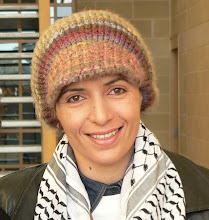What is happening now in Gaza is a terrible madness. There is no doubt about this fact. However, a central question is must be raised at this juncture: why is this madness taking place? Engaging adequately and honestly with this question requires first seeking answers to other several questions: Where did this chain of events originate? Shouldn't one begin with the cruel joke of Israel's withdrawal from Gaza in September 2005, praised by the world as a brave beginning while in point of fact it imprisoned Gaza and severed it from the whole world, including the Palestinian West Bank? Shouldn't one start with the throttling siege and financial boycott imposed by the west upon the Palestinian people, depriving doctors, teachers, engineers and all civil society sectors of their right to livelihood after Hamas won the 2006 elections? Shouldn't one commence with the security apparatus controlled by Fatah and its resistance to transferring power to the government elected democratically in January last year?
I am an ordinary Palestinian who is tired of raising questions and seeking answers। In 1993 I spent a year in Israel studying Hebrew getting to know the Israeli people. In 2002, I came to the University of Exeter to study Middle Eastern politics and learn about possible ways forward towards ending our own plight and that of the Israelis. Yet the more I come to know, the more distressed and depressed I become. And the more I come to know the fewer answers I am able to provide even to questions coming from young children, including my own.
For many Palestinians who live the horror of the bloody factional fight both in Gaza and the West Bank, answers to the series of questions raised above are pretty straightforward। Yet, they also know that their answers, as well as their suffering and daily causalities, totaling over 1500 over the past year alone, at the hands of Israel and now at the hands of Palestinians, are of little importance in the eyes of the world. After all who cares about Gaza, the most densely populated area in the world? Who even wants Gaza? Years ago, it was the former Israeli PM Itzhak Rabin who dreamt that Gaza would simply drown in the Mediterranean. Today, Gaza is drowning in blood but also in starvation, in isolation, in a lack of resources and mechanisms to enforce the law, in the disorder and chaos of what the world has described as a power struggle or, more recently, a civil war.
It is an incontestable fact that Hamas and Fatah are currently committing a fatal mistake whose disastrous consequences are impacting the social and political fabric of Palestinian society and bringing severe damage upon the Palestinian cause in general। Wasn’t it Hamas that promised people to bring about change, reform and order after its sweeping victory in the last elections? Wasn’t it Fatah that made a commitment to internal change and reform in the wake of those elections? Wasn’t it the west that called for democratic Palestinian elections that would put an end to corruption in the Palestinian Authority and allow people a free and fair chance to determine their fates? The current situation in Gaza and the West Bank bears no relation whatsoever to these promises and ideals or to the aspirations of the Palestinian people. Neither change nor reform has occurred nor were the voice and choice of the people respected by the world. However, depicting the current bloodletting by the largest political factions in Gaza and the West Bank as purely internal, factional conflict is gravely misleading at best. It is no secret that he first episodes of the mess currently taking place in Gaza were generated, funded and supported from outside of the Gaza Strip. What right did the US have, for instance, to arm, train and fund one faction at the expense of others, towards undermining the legitimate government? What right did Israel have to allow weapons into Gaza while concurrently holding up humanitarian aid? And finally, what right did both Israel and the west have to imprison an entire nation including its democratically elected officials, in response to elections results which they didn’t like?
Addressing these questions is a necessary part of the solution to the bloodshed ongoing in Gaza। The sooner this happens, the more likely it is that this mess may be contained. Palestinian leaders, both Hamas and Fatah, as well as what remains of what so-called Palestinian civil society, have their own formidable share to contribute towards a solution. A shared vision of national priorities urgently needs to take precedence over divisive factional priorities. A government backed by the west alone stands no chance of functioning adequately. A government lacking legitimacy and broad-based popular support stands no chance of surviving. Only a Palestinian government combining both these vital elements will be able to endure and govern. But only today, a senior Israeli official exhorted “an emergency government without the participation of Hamas, [to which] the funds can flow". Such blindness renders prospects for an end to this chaos more bleak than ever. When will Israel at long last realize that the Palestinian problem cannot be transposed onto a strictly humanitarian crisis to be easily solved with funds? When will it recognize Palestinians as a people with inalienable rights, human dignity and aspirations? It is no coincidence that these sides of the issue have been consistently neglected.
Many experts consider the situation in Palestine as, first and foremost, a case of failed diplomacy. Today, it is also, no less, a case of failed internal Palestinian politics. The current juxtaposition of these two failures means, I fear, that the worst is coming.
Sunday, 10 June 2007
Subscribe to:
Comments (Atom)
Palestinian refugees sit at Khan Younis refugee camp


